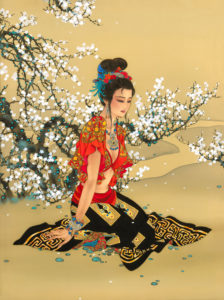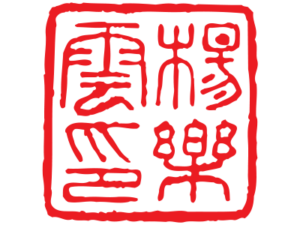Caroline Young, artwork and text
QFWF, 11-02-2021

At the end of the Han Dynasty (early 3rd century), China entered into the tumultuous Three Kingdoms, Six Dynasties period, which lasted several hundred years.
Warlords seized power and established their own spheres of influence, each plotting against the other. It was a dangerous and unpredictable time in ancient China.
Cao Pi, son of the infamous general Cao Cao, became the first emperor of Wei. Upon seizing power, he claimed the beautiful Zhen Hou as his empress.
Unbeknownst to him, Zhen Hou had already met and fallen in love with his younger brother, Cao Zhi.
Zhen Hou and Cao Zhi met many times over the years to lament their separation, yet they never betrayed the emperor.
After bearing the emperor two sons, Zhen Hou was replaced in the emperor’s affections by another. When she finally voiced her bitter resentment, she was ordered by Cao Pi to commit suicide.
One evening, as Cao Zhi was traveling alongside the Lo River, there appeared a beautiful woman in the distance who bore a striking resemblance to his beloved Zhen Hou. He hurried up to greet her, but before he could reach her, she vanished, leaving behind a single gold earring.
With deep foreboding in his heart, he rushed to the capital, where he learned of Zhen Hou’s death. In deep anguish and sorrow, he sat down and poured out his heart in the form of a poem, Lo Shen Fu, a classic that has withstood the test of time and is still popular to this day.






